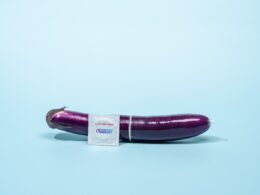Anal sex is safe as long as you and your partner use plenty of lube, and play gently. Be sure to change condoms if you switch from anal to vaginal play, and avoid using oil-based lube on latex condoms (they degrade the material).
Anal sex can be messy but it’s safe when both partners are careful, respectful, and communicate openly.
Condoms
Anal sex can be risky if a condom isn’t used. The lining of the anus is thin and can tear easily, making it easier to transfer viruses and bacteria from one person to another. This can lead to STIs like syphilis, chlamydia and gonorrhea. It also increases the risk of HIV infection.
Luckily, there are ways to reduce the risk of anal sex without a condom. People can use condoms, dental dams, lubricants or the HIV prevention drug PrEP. Condoms are the best option, especially if you’re not in a monogamous relationship or want to avoid pregnancy.
To make anal sex safer, use lots of water-based lubricant and work up to penetration. The anus isn’t used to being touched and penetrated, so it’s important not to rush into things. Use slow foreplay and communicate with your partner about how it feels. If you feel pain or pressure, stop. It could be a sign that you’re too rough or that you’ve torn a small blood vessel.
A few years ago, a Boston company created a line of condoms called ONE that are specifically for anal sex. These natural rubber latex sheaths fit over the penis and are available in different sizes. They’re easy to use and research shows that they can prevent HIV transmission as well as other STIs.
Lubricants
Many people use lube when doing anal, but it’s important to choose a safe one. You’ll want something that is safe for your body and easy to clean up. A water-based lubricant is an excellent option. It’s condom-safe and also compatible with a wide range of sex toys. However, it’s important to remember that lube will dry up and absorb into your skin over time, so you’ll need to reapply frequently during anal play.
Some people also use saliva as an anal lubricant, but it’s not recommended. A study published in Sexually Transmitted Diseases found that using saliva as a lubricant can increase the risk of infection. The authors of the study suggest that this is because saliva can carry bacteria that cause rectal gonorrhea. Other infections that can be spread by anal sex include herpes and hepatitis B.
If you decide to try anal sex, start slow and move at your own pace. Don’t feel pressured to last until ejaculation, and be sure to communicate with your partner throughout the process. Anal sex can be painful, so it’s important to talk about any pain you or your partner may feel. If it hurts, stop immediately and take steps to protect your health, such as taking a break or talking about getting tested for an STI or HIV.
Cleanliness
In the right hands, anal sex can be a safe and pleasurable way to explore sexual intercourse, but it comes with risks. Even if both partners are healthy and STI-free, anal penetration can transfer bacteria from the anus to the vagina or mouth. And infections like anal herpes or human papillomavirus (hpv) can lead to anal warts, anal cancer and other serious problems.
There are several ways to reduce these risks when having anal sex. The most important thing is to use a barrier — the best one is a condom that fits the penis, and plenty of water-based lubricant. Avoid oil-based lubricants, which can weaken latex condoms and cause them to break.
Another option is to use a condom designed specifically for anal sex. Recently, the U.S. Food and Drug Administration approved the first condom with a label that says it can be used to reduce anal sex-related STIs. The condom, called the One Male Condom, is similar to hundreds of other varieties on the market, but it has an added layer that health experts believe makes it more effective for STI prevention during anal sex.
It’s also important to keep your fingers, anus and sex toys clean to prevent the spread of viruses and bacteria like E. coli and hepatitis B. And remember to change the condom when you switch from anal sex to vaginal or oral sex to avoid transferring bacteria from the anus to the vagina. And if you don’t have a condom, consider taking pre-exposure prophylaxis (PEP), which can be 99% effective at preventing HIV infection after unprotected anal sex.
Safety
Anal sex without a condom can lead to infection just as any sexual act can. This is because the anus contains fecal material, which can cause an infection in the vagina if it travels through the anal canal. If you use a condom and take an antibiotic, such as Erythromycin, after anal sex, it can help prevent an infection.
You should always have plenty of water based lubricant with you when doing anal sex. This will reduce your chances of tearing the anus and make the experience more pleasurable. It is also important to be gentle when you are stroking the anus and not to use your fingernails, as they may rip and tear delicate anal tissue. Washing your hands thoroughly with soap and water before touching the anus is also helpful.
In a recent study, it was found that “clinical failure” of condoms occurred less often during anal sex than during vaginal sex. However, it is important to note that this was likely due to the fact that most anal sex participants used condom-compatible lubricant.
It is recommended that you change the condom before attempting anal sex again, as this will decrease the chance of bacteria being transferred from the anus to the vagina and vice versa. In addition, it is important to not have anal sex for longer than necessary, as this can increase the risk of infection.





